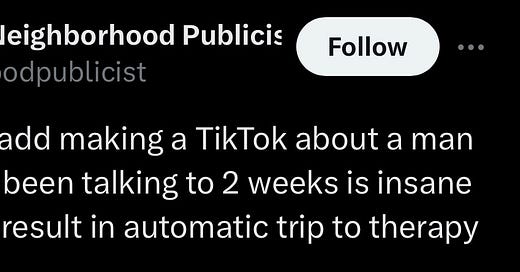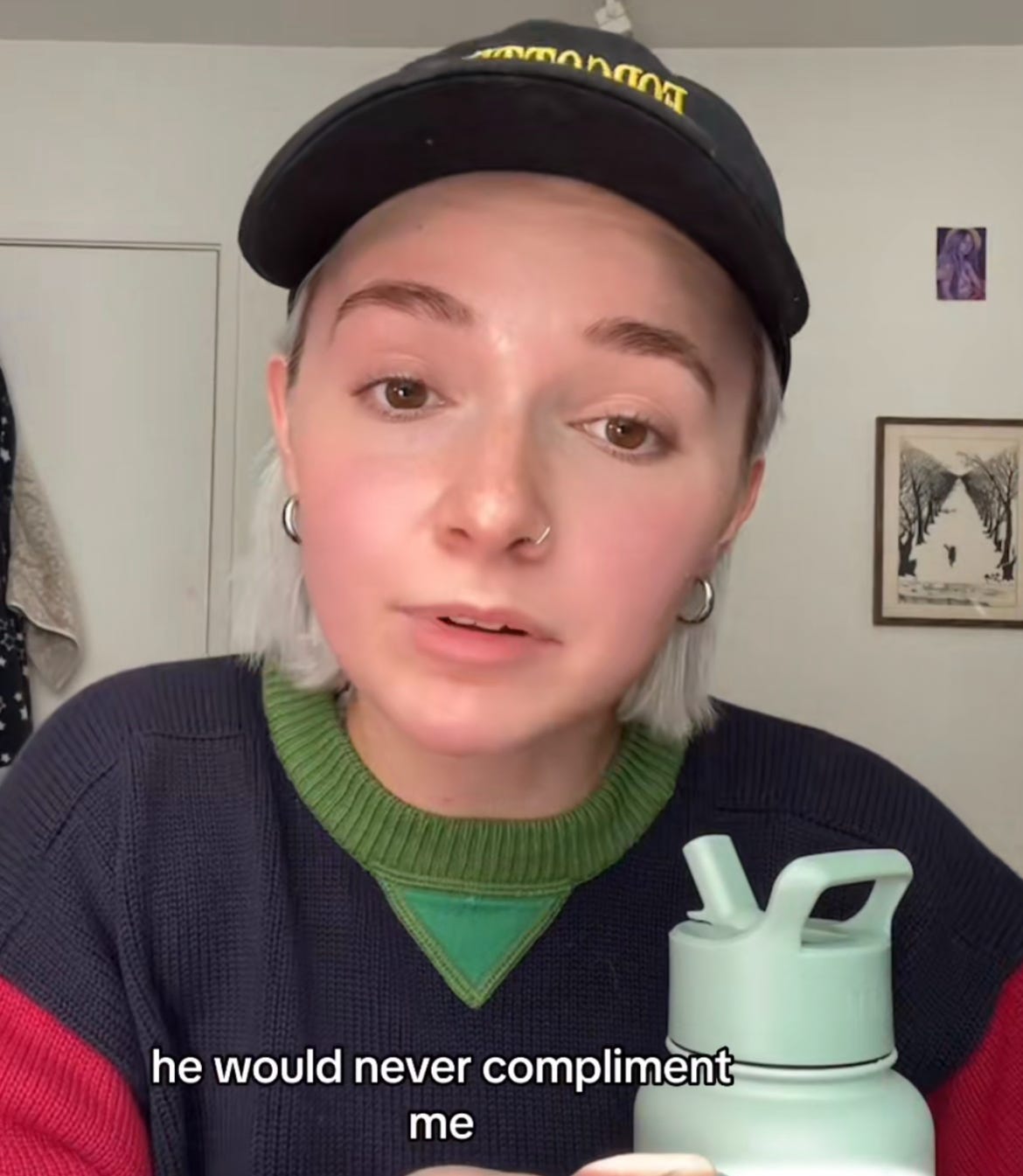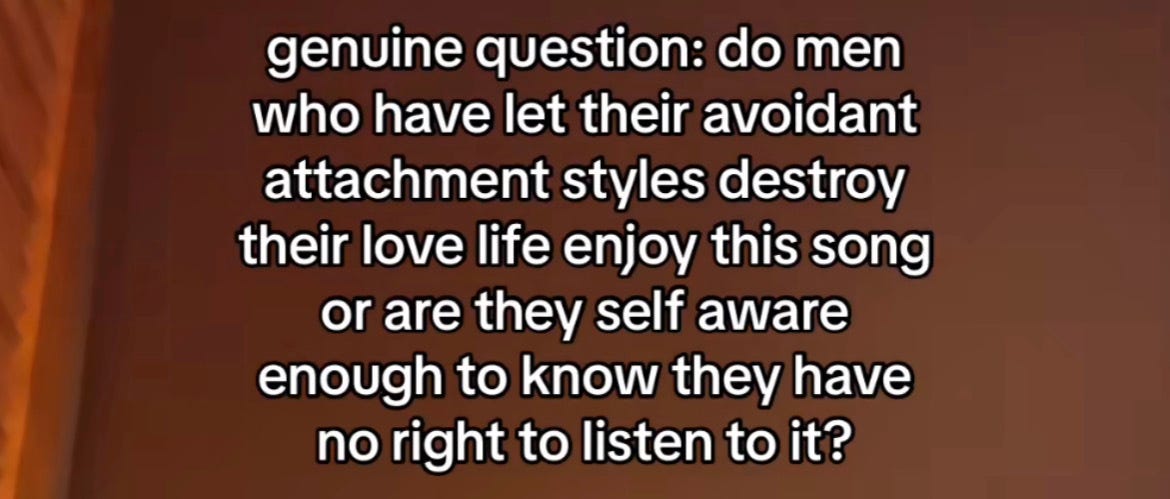A few months ago, I wrote about SituationshipTok and how it was a symptom of American Loneliness. When I posted the piece on TikTok, I stated “the avoidants have won at relationships”, cementing the idea that people with avoidant attachment styles have created the rules for modern day American courtship, evidenced by “talking stages”, “exclusive talks”, and a number of other roadblocks to being an official couple invented between 2014 and 2024.
A breakdown of SituationshipTok
I ultimately came down pretty hard against situationships, even as someone with an avoidant attachment style myself. But I have to stand in my truth: if avoidants have won dating, the anxiously attached have won the internet.
A few weeks ago, a woman went viral after stating that a man she was “talking to” cooked dinner for his female best friend. The tide of public opinion shifted immediately when it was revealed they had yet to meet in person, yet she was talking about setting boundaries with a man she had only ever texted with.
On the U Up Podcast, a woman wrote in inquiring about what it meant that a man she had been on two dates with was still on Bumble. And who can forget West Elm Caleb? I knew we lost the plot when not one of the women who came forward to denounce him could truthfully say they were official. They were nothing! Two dates is four hours total of your entire lifetime. I’m so sorry to report that seeking advice or posting TikToks about someone you barely know has become normalized, and it’s weird, I’m sorry.
But who can blame them? Some of our favorite characters in pop culture history display these traits. Carrie Bradshaw. Monica Geller. Ted Mosby. Joel from Eternal Sunshine of the Spotless Mind. The eternal questions of: “do they like me? What are we? Where is this going?” have not only become memes, they’ve become content.
Of course, others are more self aware. I’ve said that we are what we joke about, and some take the stance of pointing out their attachment issues first so they can’t be called out for them. These usually go viral, with hundreds of people claiming them or leaving comments along the lines of: “silent repost”, “same”, “so real”, “this is me if u even care”.
Some of these are also deeply sad: I remember being a teenager and writing maudlin poems about my unrequited crushes but I wasn’t posting for audiences of millions. Admitting you become unhealthily obsessed with anyone who pays attention to you before undergrad? Could never be me.
The cynical part of me also notices that clinging to stories about being anxiously attached leads to views, followers, and money. One TikToker went viral telling a story about a breakup with a man who would never call her, compliment her, make plans with her, or speak to her unless spoken to, but lashed out when asked why she stayed with him (her anxious attachment, obviously). She’s currently going viral asking people about their trauma—easy currency on the internet.
Men aren’t allowed to listen to Stevie Nicks anymore.The weaponization of mental health language online is concerning for a number of reasons, but it’s easily explained: everything complicated needs to be boiled down to its simplest parts in order to become digestible content, and it’s easy to assign value to your mental health struggle in order to make yourself “the good guy”. Unfortunately, where there is a hero, there is a villain.
In this TikTok, a queer man perfectly describes anxious attachment before declaring he is not anxiously attached, it’s everyone else who’s the problem (because they… activated his anxious attachment).
One of the downsides of allowing incredibly complex mental health terms to be boiled down to “wanting a boyfriend good/not wanting the same thing at the same time as a person you just met bad” is that other mental health terms get thrown into the mix. We’ve seen this play out across the internet for years: think about what happened to the terms toxic, gaslighting, and trauma bonding. I find it concerning that someone not wanting to be in a relationship with you is automatically labeled a narcissist. How are we going to spot people with actual diagnoses if every one of our failed Hinge matches is labeled one?
I also fully acknowledge I have been in therapy for a long time, and many of these people are young, but people are not automatically virtuous because they want to be in a relationship and make that known on the internet.
Trust me: I hate having to defend men on the internet. I promise, I do. I just do not think this trend toward gender essentialism is a healthy way to operate—on the internet or in real life.
As I was writing this, a girl went viral describing a Valentine’s Day date her male friend was planning for a girl he was not yet official with. Upon revealing he does not ever wish to make this girl his girlfriend, the comments exploded in indignation. “How dare he! This is what’s wrong with modern dating! Men are scum!” I’m going to be very honest: unless you have a conversation stating you are in a relationship with someone, you cannot just… assume you’re in a relationship with someone.
A nice dinner is not a relationship. Cuddling is not a relationship. Sex is not a relationship! (See: SituationshipTok and thousands of people crying about this very thing online.) I don't think we should normalize the anxiety. Dating is hard enough.












I do like that communication is the crux of your argument but it’s just the same issue in the opposite direction. Stating that if the conversation isn’t had then it’s not a relationship while also deriding people who seem to be seeking that but aren’t likely to be given the chance to due to modern dating conventions is just settling for the current state of affairs. Which you being someone with an avoidant attachment style benefits from.
printing this out as supplemental reading for my therapist!